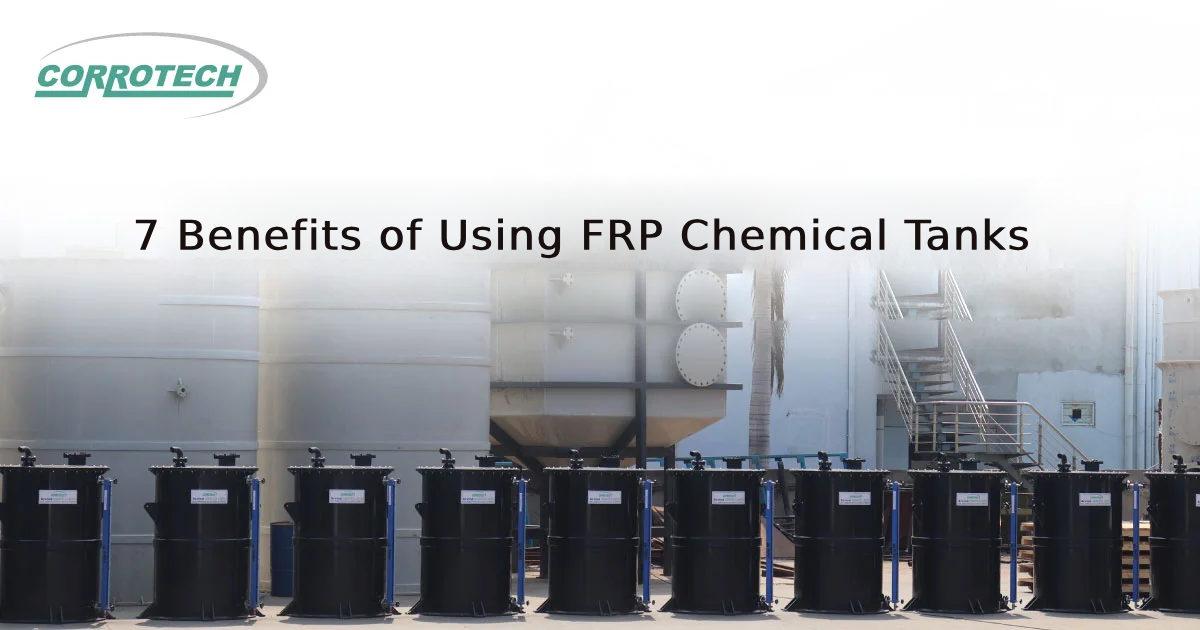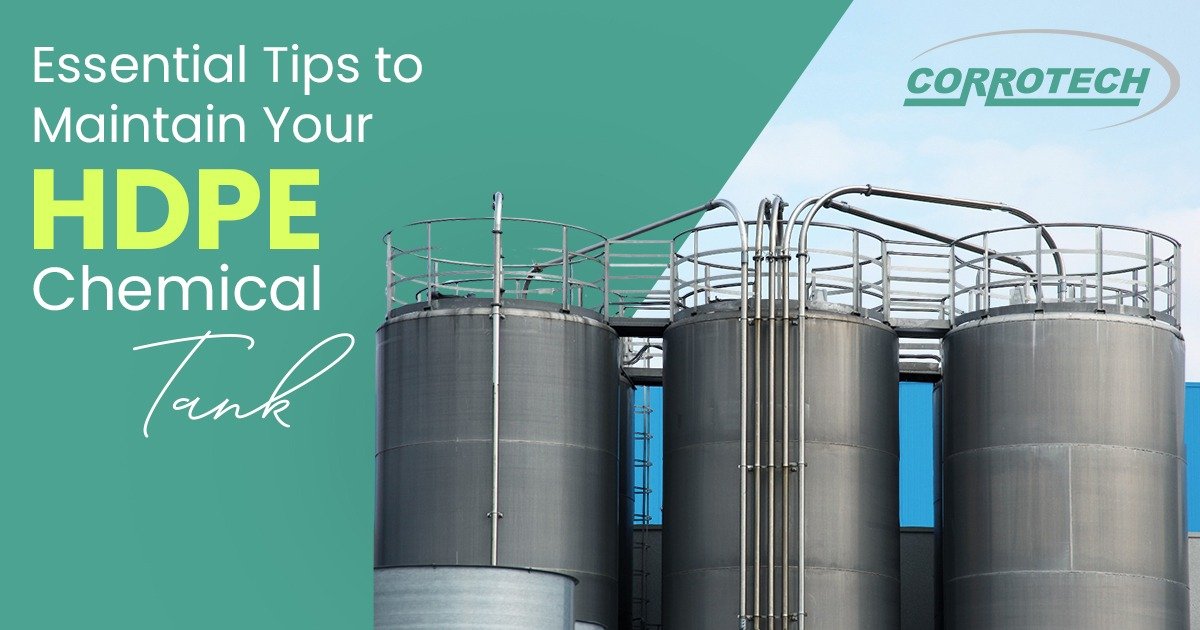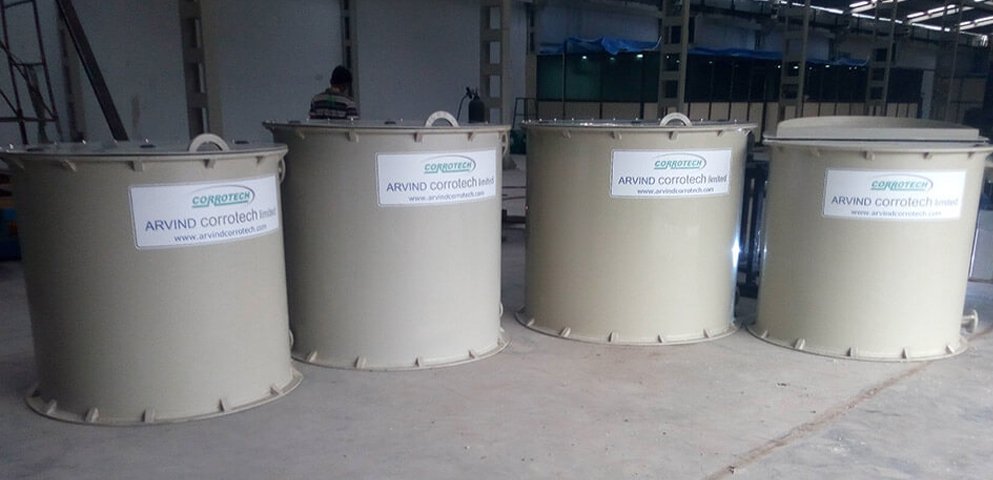Tag: chemical tanks

In commercial and industrial settings, storing chemicals is a very normal thing. Not only this, the stored chemical is being used, transferred, and processed from one tank or container to another. In this scenario, one thing that has gained momentum and popularity for its performance and durability in industry is Fiber Reinforced Plastic (FRP). FRP chemical tanks have become a go-to solution for a range of industries because it has high-strength, reliable, and corrosion-resistance features. So, let’s explore seven benefits of using FRP chemical tanks in industrial applications.
Lightweight and High-Strength
Unlike traditional chemical storage tanks that are made of concrete or stainless steel, FRP chemical tanks are surprisingly lightweight and strong. The use of glass fiber in the tank contributes to its high strength-to-weight ratio, which makes the transportation and installation easier. This is an excellent advantage for industries where there is limited space or the industry requires multiple tanks to be installed. In addition, the FRP chemical storage tank manufacturers designed it to be lightweight to reduce the structural load on the support system.
Corrosion Resistance
FRP chemical tanks are known for its remarkable corrosion resistant feature. Chemicals involve highly reactive substances like salts, acids, alkalis, etc, which can cause damage to the material of the tank. In this situation, FRP chemical tanks are excellent as they give the industry the ability to withstand harsh chemicals without corroding, degrading, or rusting. This feature of the tank also ensures that the tank remains intact. This will also contribute in extending the lifespan of FRP tanks, which makes it a long-term investment.
Impact Resistance
FRP chemical tanks are definitely resistant to chemical corrosion, but in addition to this, these tanks are also highly resistant to impact damage. The composite material of the tank absorbs shock and stress, which makes it ideal for an environment where the tanks are subject to physical impact. Unlike traditional tanks that might crack or dent, FRP tanks are more resilient.
Versatile and Customizable
FRP chemical tank manufacturers understand that it is an important tool to be used in industries, therefore, they engineer it to meet the requirements of a wide variety of applications. FRP materials are flexible and you can customize it as per your requirements. In addition, you can choose different resin systems which will enhance the overall ability of the tank and will make it extremely versatile. So, overall FRP chemical tanks can store a wide range of chemicals.
Lower Maintenance
Compared to metals and its concrete counterparts, FRP chemical tanks are of low-maintenance. These tanks require fewer repairs overtime as these tanks are resistant to UV degradation, corrosion, and impact damage. Unlike traditional materials that need treatment on a regular basis, FRP chemical tanks are designed to last longer with minimal maintenance. In addition to this, cleaning and maintaining an FRP tank is less costly and easier because of its amazing features. This amazing feature of the FRP chemical tank ensures that the tank performs optimally in their service life.
Environmental Sustainability
Unlike older days, industries now are moving towards sustainable practices and in this journey, FRP chemical tanks have become a great consideration. Not only this, as per the top manufacturers of FRP chemical tanks, its manufacturing process generates less environmental waste in comparison to other materials. As these tanks are highly durable, it does not require frequent replacements which minimizes the overall material consumption. In addition, FRP chemical tanks prevent leakage, which save the environment from harsh and hazardous chemicals. So, go for FRP tanks if you think of the environment and believe in returning back to nature.
Thermal Insulation
Last but not the least, thermal stability is another benefit of FRP chemical tanks. These tanks are excellent insulators, which means it can maintain the temperature of the chemical. This feature is crucial in industries as lack of temperature control can lead to damages and harmful reactions.
After going through the above mentioned points, it is clear that FRP chemical tanks offer a wide range of benefits which is ideal for storing and transporting chemicals. We can say that FRP water tanks are a forward-thinking choice as it prioritizes sustainability, safety, and efficiency. If you are looking to invest in FRP chemical tanks, check Arvind Corrotech as its a renowned FRP tank manufacturer in Ahmedabad.

HDPE chemical tanks are no normal tanks. HDPE here stands for High-Density Polyethylene and it is renowned for its resistance and durability to store and protect a wide range of chemicals. These tanks play a crucial role in multiple industries like manufacturing of agriculture, by safely handling and storing corrosive and some harmful chemicals and liquids. However, these tanks can also fail in their tasks if proper attention is not paid. So, to ensure the effectiveness and longevity of the HDPE chemical tanks, it is important to maintain the tanks throughout. Let’s discuss in deep on how an individual can keep the HDPE chemical tank in optimal condition:
1. Regular Inspection and Cleaning
Maintaining the cleanliness of your HDPE chemical tank requires regular maintenance. Schedule daily inspections for signs of wear, tear, or damage. During inspection, look for cracks, dents, or dents that may indicate a potential problem. Cleaning should be done regularly, especially if the tank is storing materials that will leave a residue. Use non-toxic cleaning tools and avoid harsh chemicals that can damage HDPE materials. Keeping the tank clean and free of contaminants will help prevent chemical reactions that can damage the tank.
2.Monitor Chemical Compatibility
A range of chemicals can be mixed with HDPE tanks, but not all materials are compatible with the material being referred to. Always check the chemical compatibility of the materials you want to store.The tank material should not be eroded by the chemicals, so check with the manufacturer or your local specialist to ensure it is as pure as possible. Incompatible chemicals can damage the tank, cause damage, or damage the structure. Keeping track of chemicals and their disinfectants will help maintain durability and safety.
3. Prevent Overfilling
When filled with chemical or any harsh liquid, the HDPE tank will break easily and exert excessive pressure, which can harm the chemical tank’s structure. To avoid overfilling, use level indicators and alarms to warn you when the tank is nearing capacity. Control the flow of filling equipment and ensure it is calibrated to prevent overflow. Maintaining proper levels of chemicals not only prevents injury, but also ensures the safety of the facility and employees.
4. Maintain Proper Temperature Control
Depending on the temperature, HDPE chemical tanks can exhibit superior strength and durability. Both high and low temperatures can cause the HDPE material to expand or contract, resulting in cracks or breaks. Install temperature control systems to keep the tank within an acceptable temperature range. In very hot environments, consider tank insulation or the use of heat-relieving medications to protect against stress.
5. Protect from UV Exposure
UV radiation causes the deterioration of HDPE tanks when kept for an extended period. UV rays can cause materials to become brittle over time, leading to cracking and structural failure. If your tank is exposed to the sun, use a UV resistant cover or a cover to protect it from direct exposure. Additionally, placing the tank in a sheltered area or building a sheltered deck will help prolong its life.
6. Inspect and Maintain Tank Fittings and Valves
Chemical transfer and handling are facilitated by tank equipment, which includes valves. Check these links for signs of wear or tear. Make sure all valves are working properly and closed. Replace worn or damaged gaskets, seals or fittings to prevent leaks and maintain vehicle integrity. Proper maintenance of these parts will help the safe and efficient operation of the tank.
7. Implement Proper Safety Measures
Safety measures are important to prevent accidents and ensure the safe transport of chemicals. Emphasize that the tank has all the necessary safety features, including pressure relief valves and safety systems. Instruct your staff on the appropriate handling methods and emergency procedures for a spill or any other situation. Safety training and adherence to safety procedures will help prevent accidents and ensure that the vehicle operates within safe limits.
8. Keep Detailed Records
To ensure the proper handling of your HDPE chemical container, it is important to keep track of all inspections, maintenance, and chemical usage. Keep track of inspection dates, cleaning schedules, chemical compatibility checks and any repairs or replacements made. Detailed reports help you identify recurring patterns or issues that you can address as soon as possible. Additionally, these records are useful for compliance and security audits.
Regular attention to details and a proactive approach is crucial while maintaining the HDPE chemical tank. All the steps mentioned above will not only extend the lifespan of the tanks but it will also enhance the operations and on-location safety of the workers. Moreover, as a responsible owner, you need to invest time and resources to maintain the tanks, especially to protect the facilities and environment. Remember, the key here is excellent observation and consistency. You can also check Arvind Corrotech for best and advanced HDPE chemical tanks. Adhere the tips mentioned above to ensure safety and support for years to come.

Manufacturing units and chemical companies use a wide range of tanks for various applications. Applications include surface treatment processes and storage tanks. Furthermore, these tanks are available in different types and configurations and play a significant role. These tanks store intermediate, semi-finished, and final products. Besides, the tanks are also used to complete many important processes.
In this short and important write-up, we are focusing on the role and application of tanks. Besides, industries using the product will remain our important priority.
Different types of tanks
The design, construction, and operation of tanks require experience and expertise. Besides, crucial subjects like chemical and acid compatibility with tank material, leaks, spills, loading, and unloading also present various challenges and environmental threats.
There are several types of tanks, depending on their applications.
- Chemical process tanks
- Storage tanks for industrial chemicals
Chemical process tanks
Tanks for chemical/ surface treatment processes require brilliant design and construction as the tank comes across numerous challenges. Moreover, such tanks undergo various tests and experiments to ensure their competency to withstand chemical and physical challenges. All worst-case scenarios are visualized, created, and experimented with to finalize the design and ensure quality.

Material
These tanks are completely different from normal tanks. In addition, special-purpose tanks use HDPE, & PP (non-metallic) among others to manufacture.
Why do industries use specific tanks?
Industrial tanks perform a wide range of applications and are suitable for use where MS tanks do not work. Arvind Corrotech is a leading company with a modern manufacturing facility in Ahmedabad, India. It offers a wide range of excellence-driven Chemical Tanks.
Types
- Acid tanks
- Blend and mix tanks
- Buffer tanks
- Circulation tanks
- Feed tanks
- Filtrate tanks
- Holding tanks
- Jacketed tanks
- Pressure vessels
- Pump tanks
- Reactors
- Receiver tanks
- Solution tanks
- Solvent tanks
- Storage tanks
- Stripper/Scrubber Columns
- Surge tanks
Similarly, there are many other uses of tanks. Application
Chemical process tanks have found applications in plenty of industries. These include:
- Textile
- Leather
- Paper
- Plastic
- Steel
- Oil and petrochemicals
Harsh challenges
The process tanks witness harsh chemical and manufacturing processes. Therefore, they should be resistant to corrosion and harsh weather, for example, rainfall and cyclone.
Chemical storage tanks
As a businessman, if you plan to procure a chemical storage tank for your manufacturing process, it’s important to the chemical you are planning to store. Here is a classic example of a lack of knowledge. Many think that a tank that stores water and other edible fluids is competent to hold industrial chemicals. This is a wrong perception. Therefore, it’s important to buy the right product. And a tank is a tank? This is not true always!
Why do industries require special tanks?
A chemical storage tank has various uses, for instance, storage, mix, and transport of a wide range of chemicals. You might have seen similar tanks at chemical factories, surface treatment plants, pharmaceutical companies, textile factories, etc.

Different materials for different chemical
A few chemicals require a different type of material for storage. Let’s understand it with an example, highly oxidizing materials, including sulfuric acid. It can’t be stored in a normal tank as oxidation degrades the tank. It can cause a dangerous situation. Experts are of the opinion that to store such chemicals, special-purpose materials i.e. PP, and HDPE is a must.
Why tanks are necessary?
Don’t forget that chemicals that produce sludge, including ferric, alum, and polymer offer many challenges. The sludge-producing chemicals require tanks with a few specific features. It should drain completely. The fuming tanks require bottom full drainage. Why is it like that? There’s a logical reason behind this. A similar kind of design doesn’t require a person to enter the tank for cleaning.
Storage of different chemicals
These special signed tanks store several types of hazardous industrial chemicals, these include below mentioned few among others:
- Hydrochloric acid
- Sodium hypochlorite
- Sodium hydroxide
- Sulfuric acid
- Urea exhaust
- Petrochemical exhaust
- Ferric chloride
- Soda ash sodium carbonate
- Industrial wastewater
Choose the perfect manufacturer
As chemical processes require specific chemicals, never compromise with quality. The name and fame of the manufacturer are important. Few manufacturers in Ahmedabad with rich experience in manufacturing chemical process tanks and chemical storage tanks have hands-on experience.

